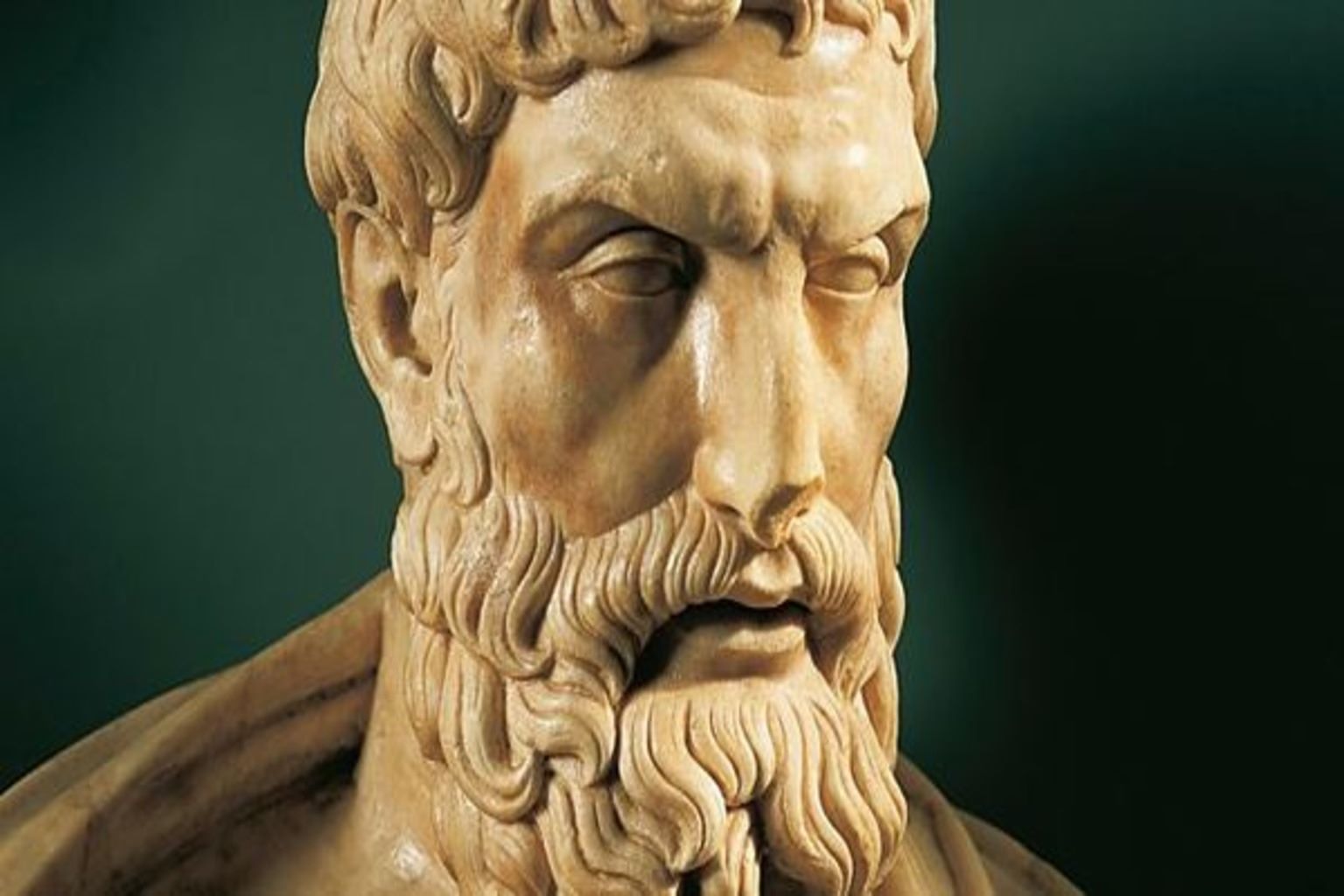We live in a time where almost everything is designed to stimulate via scrolling, spending, and striving. But stimulation isn’t the same as pleasure, and pleasure isn’t the same as peace. Epicurus, a Greek philosopher living in Athens, believed we’d lost sight of that difference long ago. His teachings were about learning how to live without fear: of death, of disappointment, and of never having enough.
This article is a conversation where we slow down enough to find out how to be an Epicurean and understand what Epicurus meant by a life well-lived. And more importantly, how to bring that understanding into our modern world, without losing its shape.
What Is Epicureanism Really About?
In 4th-century BCE Athens, philosophy usually played out in forums or under porticos: formal, masculine, and filled with debate. Epicurus stepped away from that tradition; he opened a school in his garden, inviting people to gather and think quietly together.
His answer was in his lived experience, and the garden became a place where people gathered to practice steadiness.
What is Epicureanism? It’s a life shaped by that question: how much fear are we carrying, and what opens when we begin to let it go?
Epicurus offered simple and potent reminders:
- That simple meals are often enough
- That friendships matter more than approval
- That satisfaction doesn’t always look like success
Epicureanism doesn’t chase peace, it listens for it. In the space between urges and expectations, something quieter begins to rise, and that’s where steadiness takes shape.
The Core Principles Of Epicurean Living
The Greek philosopher, Epicurus, didn’t speak in absolutes; he spoke in reminders and small truths meant to keep the mind still. The principles of Epicureanism were never framed as rules; they are ways of easing suffering. He taught that fear makes life smaller, so he gave his students a short phrase to carry with them:
“Don’t fear god,
Don’t worry about death,
What is good is easy to get,
What is terrible is easy to endure.”
These lines were a doorway to two states he valued deeply: ataraxia, the quiet of the mind, and aponia, the freedom from pain.
Pleasure, in his view, wasn’t found in excess; it was found in enough. He encouraged his students to step back from desire long enough to question it:
- Is this need real?
- Or is it noise?
- Does it move me toward ease or further into restlessness?
When you know the answer, life simplifies and there’s less striving. It leads to less tension and more room to breathe. That, Epicurus believed, was the foundation of happiness. And in an era that promises peace through consumption, this philosophy offers something else: clarity and rooting. That often begins at home, with what we touch, say yes to, and allow in our everyday lives.
How To Practice Epicureanism In the Modern World
The Epicureanism philosophy has always been about how we move through the world. Epicurus noticed how easily people confused motion for meaning. He suggested something slower, he suggested a rhythm you choose, instead of one set by urgency.
You don’t need a fancy retreat to practice this, just enough space between one choice and the next to remember what you value. Epicureanism doesn’t ask you to cut away your life; it is about chipping away and shaping it with more authenticity.
To live that now, try paying closer attention to where your energy lands.
You might:
- Begin the day with quiet before reaching for your phone
- Walk without filling the silence with sound or distractions
- Eat in ways that make the body feel light afterwards
- Say no without explanation, and mean it
There’s freedom in knowing that pleasure doesn’t have to arrive dramatically. Sometimes it’s already present; the way sunlight rests on a wall, in how a conversation slows your pulse, in food that nourishes instead of making you feel heavy. Epicurus believed joy wasn’t a prize; it was a state made possible by clearing space, and he helped his students see what has always mattered.
RELATED READING: How To Live Like A Stoic: 12 Ways For Resilience, Strength, And Peace
Epicurean Diet: It’s Not What You Think
The Epicurean food philosophy was shaped by attention, and Epicurus asked his students to notice how hunger felt, how satisfaction arrived, and how quickly indulgence turned into discomfort. Food was meant to sustain, ease, and nourish, not interrupt it.
He ate bread, olives, and water by choice, because they were enough, and because it left space for bodily grounding. The meal, for him, was a moment to meet the body with clarity. Taste mattered, but what stayed in the body after mattered more.
If you want to eat like an Epicurean today, consider this:
- Let your body lead the pace, not the clock
- Begin meals by asking what you truly need
- Pause mid-meal and notice if you’re still present
- Eat ingredients you can pronounce and recognize
- Keep positive company while eating
Satisfaction is about noticing what’s already doing its work, that may be the flavour, the warmth, and the quiet afterwards. It’s the moment the meal supports you, not overpowers you.
Try these small additions too:
- Sit near a window if you can
- Avoid multitasking with your meal
- Use smaller plates and smaller forks
- Don’t skip meals as a strategy for control
- Keep a journal of what feels light and gives you energy
Pleasure, Epicurus believed, came from what lingered after. That fullness that doesn’t make you lethargic, but brings a feeling of satiety. And that is the philosophy you carry with you long after the meal is done.
The Role Of Mindfulness In Epicureanism
What does mindfulness mean? Is it about sitting still with your eyes closed, trying to block out the noise? Is it a thirty-minute, extensive meditation practice? Or is it something internal and more personal to you?
The Epicureanism philosophy doesn’t mention mindfulness in its name, but it lives in its crux. Epicurus encouraged people to be in the world fully without detaching from it; to observe themselves with the same clarity they used to study the stars.
He taught that most suffering grows in the absence of attention, when we get caught in the motions of life. When pain or fear goes unnamed, it lingers, and that’s why he placed so much importance on awareness. It wasn’t a practice to perfect, it was a habit to inculcate over and over again: a habit of noticing.
To try that today:
- Pause before acting on irritation; take time to reply to that message or process that comment
- Ask where a craving is pointing before moving toward it: Are you tired, anxious, or avoiding something else? Dig into the deeper emotional need that underlies a craving.
- Watch for patterns that leave your energy drained, like doomscrolling, overbooking yourself, or endless multitasking
- Feel your body’s signals without explaining them away; sit with that headache or restlessness instead of overriding it with caffeine or distraction
- Let moments end fully before reaching for the next; finish the walk before picking up your phone, take one deep breath before checking the next task
Mindfulness, in this sense, then, becomes about seeking internal clarity and less about silencing the mind. You observe, so you can respond in alignment with yourself. You pause, so you don’t repeat old patterns, and that is the mindfulness that protects your peace more than it demands anything of you. Mindfulness in the Epicurean Philosophy is additive in nature and always at your fingertips.
When we begin to examine what we pursue and why, the fog in our minds clears. Epicurus believed that most fear comes from confusion, and most peace from understanding. Awareness was how his students reclaimed their time, their choices, their sense of what they valued, and that, in his garden, was called wisdom.
RELATED READING: Absurdism vs. Nihilism vs. Existentialism: Meaning, Differences, and Examples
Epicureanism vs. Hedonism
This requires a distinction between Intensity and intention, so picture this: You’ve had a long week, so you book the best table, order the extra drink, stay out too late, and scroll yourself to sleep. It feels good, but only for a moment.
Then comes the crash: fatigue, guilt, the search for more. This is the kind of pleasure we see most often; it’s reactive in nature, even impulsive and loud. This is hedonism, it’s built on the idea that more is better, that joy comes from quantity, intensity, and from immediate reward.
But the philosophy of Epicurus points in another direction. It asks a deeper question and invites you on a journey of reflection: What remains when the moment ends? Epicurus said that pleasure isn’t the abandonment of discipline, but rather it is the reward for it. He taught his students that lasting comfort and long-term pleasure come from examining desire, not obeying it, and certainly not being at the mercy of it.
Here’s how that looks:
- Letting your weekend be quiet without trying to earn it
- Ask yourself if the plan adds joy or just fills time. Are some people calming your nervous system or just curbing your boredom?
- Keeping music low enough to process it, so that it allows you to remain in tune with your internal world
- Reading a page slowly instead of jumping to the next chapter, and reflecting on how you feel at the end of the page. Ask: What value did I gain?
- Making choices that make you feel proud and content the next morning
In his world, clarity was the foundation of joy, and that means taking charge of how you add pleasure and indulgence to your life.
Where hedonism fills the calendar, Epicureanism clears space. Where hedonism multiplies wants, Epicureanism simplifies needs. The pause between craving and impulsive consumption makes all the difference. Epicurus refined the concept of pleasure, and what he left behind was more sustainable, more nourishing, and freer.
Building Your Epicurean Circle
According to the Epicurus philosophy, friendship was the closest thing to emotional architecture. A life was only as strong as the people who held space inside it. He saw how connection could anchor people to peace when everything else felt unsteady and enhance their quality of joy.
You can begin with small gestures:
- Send a message when you think of someone, even if it’s brief and do it without the pressure of an expected response
- Make plans that center around slowness: tea, walks, shared silences, rather than loud spaces and instantly gratifying activities.
- Prioritize those who feel easy to return to after a distance
- Stay open to those who offer presence, even without words. Notice who feels like a haven, and choose them again.
- Ask for help in small ways, like a walk or a call
- Invite someone to eat with you, even if it’s just toast
Epicurus didn’t expect every friendship to last forever, but he believed the ones that did could change your life’s trajectory. He created space for difference as well as the care that could grow in that space.
The right circle will rarely be loud, but it will always be there, quietly cheering you on and offering a hand. When you begin to build your Epicurean circle, you’re doing more than seeking company; you’re also protecting your peace in a world that makes it hard to hold it.
Living An Epicurean Life With Purpose And Pleasure
Epicurus believed and lived by this: joy should be felt in the living and not in the aftermath. A pleasurable life wasn’t defined by thrill; it was made meaningful by how little pain it left behind. That’s where purpose begins: with a quiet sense of alignment.
To define Epicureanism today, ask what no longer deserves space. Is it guilt? Overthinking? Performing for approval? Then ask what you want to build instead.
The philosophy of Epicureanism gives you tools for those shifts. They begin with attention and grow with choice.
So here’s to a few gentle habits:
- Keep one weekend free every month
- One night without a to-do list
- Let your mornings be slower by five minutes
- Let yourself enjoy something small without proving its value
- Eat something warm, just because
Epicurus didn’t see joy as a prize; he saw it as a pattern and a practice of remembering what helps you stay close to yourself. It is an act of returning to yourself, and when that becomes part of your everyday, purpose won’t need to be found; you will find that it will already be present.
Conclusion
Learning how to be an Epicurean does not ask you to gain mastery over a lifestyle. It asks you to trust what feels good and what remains when the day is over. His students were not asked to chase more; they were prompted to sit with what was already here and to find within it a rhythm that felt their own.
And as Epicurus once wrote, “The wise man does not deprecate life nor fear the cessation of it; he neither begs for life nor does he seek to avoid death.” Let that remind you that to live well is to live attentively, and the rest will come.
FAQs
1. What does it mean to be Epicurean today?
It means stepping away from noise, choosing pleasure that doesn’t exhaust you, and letting enough feel like plenty.
2. Can Epicureans be spiritual or religious?
If your beliefs offer stillness and care, they belong, and therefore, there’s room for belief as long as it doesn’t add fear. Epicureanism makes space for quiet faith that adds to your life.
3. Is Epicureanism relevant in a fast-paced world?
Yes, absolutely, and especially right now in a world full of instant pleasure. It’s a way to stop without falling behind and to live without being consumed.
4. How does Epicureanism improve mental well-being?
Epicureanism improves mental well-being as it clears space and reduces noise. It helps you notice what you’ve been missing while chasing more.
8 Amazing Books To Read When You Feel Lost And Directionless




